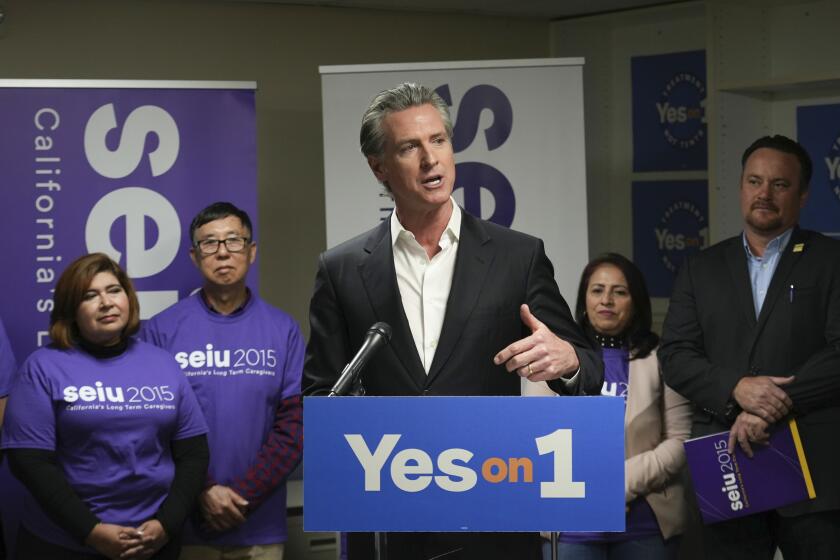Voters approve Proposition 1, Newsom’s overhaul of the California mental health system

- Share via
The close contest over Gov. Gavin Newsom’s $6.4-billion bond measure to transform California’s mental health system finally ended Wednesday, more than two weeks after the primary election.
Though election officials have until April 12 to certify the results, Proposition 1 led with 50.2% of the vote when the race was called with more than 7.5 million ballots counted statewide.
“This is the biggest change in decades in how California tackles homelessness, and a victory for doing things radically different,” Newsom said. “Now, counties and local officials must match the ambition of California voters. This historic reform will only succeed if we all kick into action immediately — state government and local leaders, together.”
Gov. Gavin Newsom crafted the measure to reform California’s mental health system, including a $6.4-billion bond for new facilities.
The Associated Press called the passage of Proposition 1 on Wednesday.
Proposition 1 approves the issuance of a $6.4-billion bond to support 10,000 treatment and housing beds and reconfigures a 20-year-old tax for mental health services to also fund treatment for drug addiction.
The plan is essential to Newsom’s strategy to address California’s homelesness crisis, an approach that departs from the liberal model of voluntary treatment to a more moderate stance of compelling people with severe mental illness and substance disorders into care.
The bond measure is an important piece of his policy because it provides funding for beds that counties said was essential to accomplishing his goals. But the measure also faced criticism from civil rights groups on the left, which were concerned about the repercussions of funding secure mental health facilities, and his GOP opponents on the right, who scoffed at the estimated $14-billion price tag amid a massive state budget deficit.
Despite the confidence he projected about Proposition 1, Gov. Gavin Newsom’s ballot measure on California’s mental health services is leading narrowly.
Despite millions spent by the yes campaign, pollsters say Proposition 1 barely squeezed through because of lower-than-expected voter turnout that inflated the Republican share of the electorate. Election returns showed that inland counties and parts of Southern California opposed the measure, while a majority of voters in Los Angeles and the San Francisco Bay Area backed the plan.
Newsom’s campaign made a strategic decision to place the measure on the March ballot because it believed it could withstand a more conservative electorate. Holding off until the general election in November, when more Democrats are expected to vote, could have boosted the measure’s chances of success, but also would have left Proposition 1 competing with other bonds for voter support.
The Californians Against Proposition 1 campaign said the measure wasn’t a huge win for Newsom, but “an embarrassing squeaker of a victory.”
“By cutting off services and reducing early intervention programs, Prop. 1 could have the perverse effect of increasing the number of people homeless and in need of services,” the campaign said in a statement.
Newsom took a victory lap of sorts at a news conference touting the measure’s passage on Thursday morning in downtown Los Angeles.
Los Angeles County Sheriff Robert Luna — standing onstage with medical professionals in white coats, the head of a large firefighters association, local and state elected officials, and other supporters of the proposition — joined a chorus of praise for Newsom.
Luna said that by approving the measure, voters would be giving sheriff’s deputies, police officers and other first responders “more alternatives and better solutions” as they respond to people “struggling with mental illness and addiction.”
“I believe that this is going to reduce the workload for our deputies and our police officers out in the field,” Luna said.
Luna said the measure also would reduce the number of encounters that law enforcement officers have on a daily basis with people in crisis and would reduce the county’s jail population “in the long run.”
Speaking last, Newsom described the measure’s narrow victory as historic, but also addressed the slim margins head on.
“We recognize and clearly, soberly, we’re reconciling the fact change has its enemies,” Newsom said. “Change is tough. Change is hard. And so these have been a few long weeks, sleepless weeks.”
The public was cynical that just spending more money would solve the problem, he said, adding that he shared that cynicism and believed this reform would offer “a completely different dynamic.”
More to Read
Sign up for Essential California
The most important California stories and recommendations in your inbox every morning.
You may occasionally receive promotional content from the Los Angeles Times.














